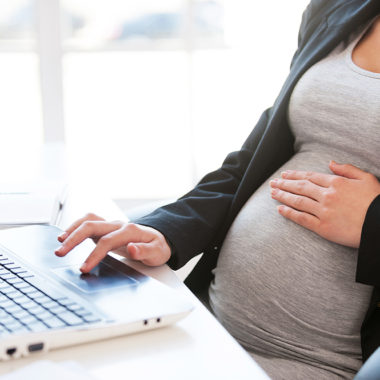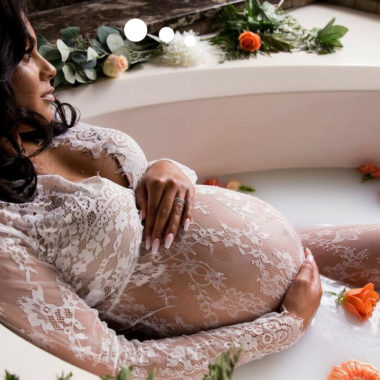During pregnancy, the development of the fetus changes the physical appearance and is likely to interfere with sitting, standing, or sleeping posture. Sleeping is an essential part of pregnancy, expecting mothers sleep more than usual especially during the first trimester as a result of progesterone production and the body trying to adjust to its new state. However, with a lot of pregnancies, sleeping becomes more difficult as the month progresses. This article will be shedding light on why pregnant women may find sleeping difficult, sleeping position to try out, the ones to avoid, tips for better sleep and pillow recommendations for comfort.
Why sleeping may be difficult during pregnancy.
In as much as sleeping is important during pregnancy, some pregnant women find it difficult to sleep. Some of the reasons are:
- Heartburn: Heartburn is usually caused by the reflux of stomach contents (which is usually acidic in nature) back to the oesophagus. The progesterone secreted during pregnancy causes drowsiness and makes the valve between the stomach and the oesophagus to relax, hence, causing the reflux. In order to prevent this, women are adviced to avoid foods rich in fats, spicy foods and fried foods (especially before going to bed). Using pillows to support the upper body while sleeping can be effective in avoiding reflux.
- Frequent urination: This first occurs at an early stage (first semester) of pregnancy because of an increase in the hormones progesterone and human chorionic gonadotropin. At other stages of pregnancy such as second and third trimester, increased urination frequency is as a result of pressure on the bladder as the baby increases in size. Avoid drinking too much water before going to bed and avoid food containing caffeine which can bring you to the toilet more often.
- Shortness of breath: Transportation of oxygen to the baby by the blood lead to increase in lung capacity which is common among pregnant women. They breathe more often and deeply which makes it seem like there’s an extra effort to breath. In addition, as the fetus grow, the diaphragm is pressured and leads to shortness of breath. Women should maintain good postures when sleeping, sitting or standing and avoid overdoing any activity.
- Back pain: The extra weight of the baby can put strains on the back. Backpain during pregnancy causes restlessness. Avoid sleeping on your back, maintain good posture and use pillow as prop.
Other causes may include: Stress, insomnia, sleep apnea, restless leg syndrome, bad sleeping posture, nightmares, increased abdomen, morning sickness, anxiety or nervousness; about the delivery process etc.
Related: Warning Signs in Pregnancy to Never Ignore
Sleeping positions to avoid during pregnancy.
The increasing size of the fetus makes it difficult to get a comfortable sleeping position. However, these sleeping positions are to be avoided:
- Sleeping on your back: According to studies, this sleeping position is harmful to both parent and baby as it increases the risk of stillbirth. This position rests the entire weight of the growing fetus on the back, vena cava, intestines and some major blood vessels. If done continuously, it causes severe back pain and prevents adequate blood flow from mom to baby.
- Sleeping on your stomach: This affects blood and nutrients circulation to the baby as the stomach will put pressure on the vein that pumps blood from the heart to the legs. Women naturally find this sleeping position uncomfortable as the fetus develops.
Best Sleeping position pregnant women should try out.
Mothers-to-be are adviced to go to sleep in a position that will be safer for them and the baby. The best sleeping positions women must get used to during pregnancy is “sleeping on side” (SOS), this can be either of the sides but left side is preferable. SOS eases breathing and prevents pressure on the vena cava resulting in maximum blood and nutrient flow into the placenta. Also, the liver is located at the upper right side of the abdomen, it is more advisable to sleep on the left side to prevent the heavyweight in the uterus on the liver. This helps the liver to carry out its functions effectively, that is, properly getting rid of waste products and fluids from the body. While maintaining this position during sleep, it is also good to keep the knees and legs bent for less swelling in your feet and ankles. Hands should be properly placed too.
For consistent comfort while sleeping, pregnant women should understand their bodies. If achieving this seems impossible, it may be beneficial to get added support for optimal consistent comfort.
Cue in Pregnancy Pillows
Pillows are very good as it gives extra support and comfort. Choosing the best pillow can help expectant moms to have a more pleasurable sleep and help them maintain a good sleeping position. Some pregnancy pillows we recommend are;
Pregnancy Pillow Full Body Pillow
The Pregnancy Pillow is what every expectant mom’s dreams are made of! This pillow offers full head and belly support, so you can tell those pregnancy aches and pains to give it a rest. It’s made with a plush polyester filling, two ultra-soft case options, and a hidden zipper to maximize your comfort. Plus, the removable case can easily be thrown in the washing machine for easy care!
Boppy Side Sleeper Pregnancy Pillow
This is designed in a way to give support to the back and the baby bump at once. It has a signature stretch panel that helps expectant moms to lay comfortably on their sides. It gives comfort, stability and support when sleeping, sitting or lounging. It is highly preferred because it has a compact design that makes it easily carried when traveling, it is filled with virgin fiber and removable slipcover which makes both the pillow and the cover machine washable. Also, this pillow can be used after birth for support.
Queen Rose U-Shaped Pregnancy Body Pillow
This U shaped body pillow is used to support the back, hips, knees, neck, and head of pregnant women and nursing moms to ease any form of discomfort. This maternity pillow has a storage bag to help carry it from one place to another. Pillows are available in different colors and patterns measures from 55″ to 65″ inches long, 31″ inches wide, and 7″ inches high, providing 100% satisfaction. Women in their third trimester have been said to use this for pain relief with fibromyalgia, sciatica, gastric reflux, and congestion.
You do not need to be worried that you may unknowingly switch sleeping position to back-sleeping or stomach-sleeping during the night. Those positions are not pregnancy-friendly, especially during second and third trimester, discomfort will most likely wake you up. If it does happen, just roll onto your side like it never happened.
Other Tips For Better Sleep During Pregnancy
- Exercise regularly
- Avoid caffeine after lunch
- Make your room as dark as you possibly can
- Minimize use of electronics before bedtime
- Keep your room cool
- Use aromatherapy
In addition, knowing the underlying cause of your sleeplessness can give you a clue on how to improve it. However, over-the-counter sleep aids are not recommended during pregnancy. It is advised to seek a doctor’s attention.
- How Setting Postpartum Boundaries made me lose my brother - February 6, 2025
- How To Revive Your Sex Life After Baby - October 17, 2023
- The Sona App Aims To Make Your Child “Sleep Like A Baby” And We Tested It - May 14, 2023













